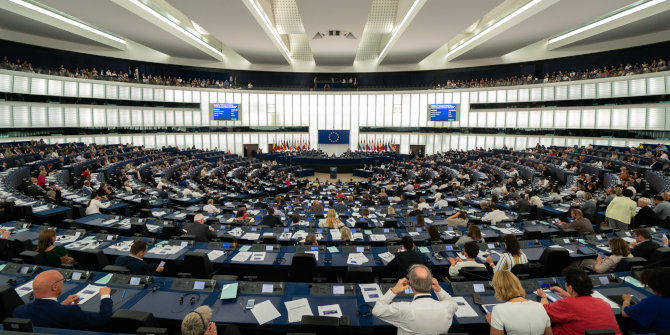 The financial crisis affected economies across the world, but the recovery from the crisis has varied significantly, with some countries quickly returning to growth and others remaining in a prolonged period of stagnation. Mark Crosby writes on the lessons that Australia’s handling of the crisis could have for Europe. He notes that many of the reforms that allowed Australia to weather the crisis followed a similar rationale to those contained in the EU’s Lisbon Agenda, outlined in 2000. Unlike Australia, however, the EU has suffered from a crisis in implementation, epitomised by the failure to find a lasting solution to the ongoing debt problem in Greece.
The financial crisis affected economies across the world, but the recovery from the crisis has varied significantly, with some countries quickly returning to growth and others remaining in a prolonged period of stagnation. Mark Crosby writes on the lessons that Australia’s handling of the crisis could have for Europe. He notes that many of the reforms that allowed Australia to weather the crisis followed a similar rationale to those contained in the EU’s Lisbon Agenda, outlined in 2000. Unlike Australia, however, the EU has suffered from a crisis in implementation, epitomised by the failure to find a lasting solution to the ongoing debt problem in Greece.
I grew up in Adelaide, a city of about one million people with a Mediterranean climate and a very large Greek and Italian community, many of whom emigrated to Australia after World War II. As a primary school student we learned that Melbourne had the third largest Greek community of any city in the world, after Athens and Thessaloniki. From the 1970s until 2010 further Greek immigration was negligible, but in the past five years a new wave of migrants from Greece and Italy have moved to Australia, chasing opportunity and jobs.
It is little wonder that young people are leaving Europe. The Eurozone unemployment rate for 15 to 24 year olds is about 23 per cent. In Spain, Italy and Greece the rate is above 40 per cent, and in France the youth unemployment rate is almost 25 per cent. German Chancellor Angela Merkel stated in 2012 that Europe accounts for just over 7 per cent of the global population, about 25 per cent of global GDP but about 50 per cent of global social spending. The view from down here is that Europe might be an OK place to be old (though a pity about the weather) but a lousy place to be young.
Greece: a view from the South
The crisis in Europe appears from this vantage point to be a crisis in implementation. The problems with a lack of flexibility, unaffordable welfare, and a lack of competitiveness are well known. In March 2000 the European Council set out the Lisbon Agenda, a proposed set of policy initiatives aimed at making Europe “the most competitive and dynamic knowledge-based economy in the world capable of sustainable economic growth with more and better jobs and greater social cohesion” by 2010. Aside from the Hartz reforms to labour markets in Germany no meaningful reforms were made in the larger European economies, and economic growth and employment creation have continued to significantly lag global outcomes.

The rising costs of welfare with an ageing population dwarf the costs of the global financial crisis and yet most countries in Europe have done little to limit future spending growth. Old age pension costs as a fraction of GDP in Australia are about one-quarter the levels of French or Greek pension costs, and just over a third of German pension costs. In Australia the pension age is being increased, and means tests for pension recipients tightened.
The Australian system is funded, with workers required to save 9.25 per cent of salaries in private pension funds. Australia’s population is still growing rapidly, and the dependency burden is nowhere near European levels. If the ageing population is seen as a significant future challenge in Australia, how is it that there is such a lack of consensus about the need to increase pension ages and find ways of privately funding pensions in countries like France, Germany and Greece?
Australia sees itself as benefitting from geographical proximity to Asia’s growth markets. Australia has been labelled “the lucky country” due to an abundance of the natural resources that Asia needs. But you make your own luck. In the 1980s Australia’s then Treasurer announced that Australia was at risk of becoming a banana republic. A Labor government reformed labour and product markets, floated the exchange rate and introduced many other economic reforms. The New Zealand government was even more radical in reforming their economy.
Many Australian economists bemoan the lack of reforms in Australia in recent years (and even point to New Zealand as a role model for reform again) but the reforms ‘down under’ in the past thirty years are along the same lines as those suggested in the Lisbon Agenda. On the fiscal front Australia ran consistent budget surpluses and eliminated Federal Government debt prior to the financial crisis. An economic crisis in the 1980s provided the impetus for bipartisan support for widespread economic reforms. It is amazing that a crisis as deep as the one Europe has experienced is not creating any significant impetus for widespread reform among European politicians, in Greece or elsewhere.
The crisis in Greece reflects a crisis in Europe’s policymaking. It is clear that Greece should not have been allowed to enter the euro. Europe violated its own Maastricht Treaty requirements on debts and deficits. This is another crisis in implementation, but not surprising given the willingness to bend the rules. Greece is bankrupt, and yet there still has not been any proper writedown of Greek debt. Avoiding writedowns is not surprising, since there really is not the financial firepower to fund a proper bailout within Europe, particularly given fiscal fragility in other Eurozone economies.
But kicking the can down the road destroys confidence and worsens the crisis – in Greece and across Europe. The Greek economy will be dysfunctional even with a proper bailout. There is no appetite for reform. But some kind of Grexit will at least give Greece the clear space to create its own future, and give the rest of Europe the space to start to tackle other economic issues – maybe even get a start on the Lisbon Agenda.
Australia is not without problems. The end of the mining boom has shown that the Australian economy is too one-dimensional, and the education and innovation environments are in need of reform. The global financial crisis has sent budget surpluses into deficit, and an ageing population is creating its own problems. But I am confident my teenage children will find jobs, and I am confident in their future. Can a French, Italian, or Greek parent have the same confidence? Greece was right not to let the Europeans run their asset sales, but they could do with the former New Zealand Treasurer Roger Douglas running their economy. And the same could be said for many other European economies.
Please read our comments policy before commenting.
Note: This article gives the views of the author, and not the position of EUROPP – European Politics and Policy, nor of the London School of Economics.
Shortened URL for this post: http://bit.ly/1NgQEu3
_________________________________
 Mark Crosby – Melbourne Business School
Mark Crosby – Melbourne Business School
Mark Crosby is an Associate Professor in Economics at Melbourne Business School. His research has focused on the economies of the Asian region, with a particular interest in the Chinese economy. He has been a regular consultant to the Hong Kong Monetary Authority, with research work there focused on the exchange rate arrangements in Hong Kong and in other Asian economies.




